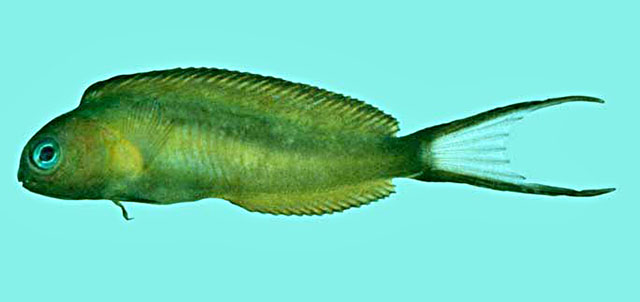| Blenniidae (Combtooth blennies), subfamily: Blenniinae |
| 9.5 cm SL (male/unsexed) |
|
reef-associated; marine; depth range 5 - 21 m |
| Pacific Ocean: Fiji and Tonga. |
|
Dorsal spines (total): 4-5; Dorsal soft rays (total): 26-27; Anal spines: 2-2; Anal soft rays: 16-17. Lunate caudal fin with elongated lobes in adults; live color dark olive with wedge-shaped, orange-yellow stripe along sides of body; cheek and opercle green; caudal-fin base and lobes black with centroposterior area transparent whitish with dusky rays. Dorsal rays IV-V (usually V), 26-27; segmented caudal rays 11-13 (Ref. 54980). |
| Adults swim above the bottom. They feed on zooplankton. Oviparous. Eggs are demersal and adhesive (Ref. 205), and are attached to the substrate via a filamentous, adhesive pad or pedestal (Ref. 94114). Larvae are planktonic, often found in shallow, coastal waters (Ref. 94114). |
|
Least Concern (LC); Date assessed: 28 March 2009 Ref. (130435)
|
| harmless |
Source and more info: www.fishbase.org. For personal, classroom, and other internal use only. Not for publication.
